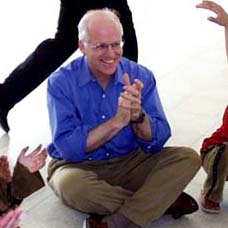
Reasons for the collapse of the Madrassa Reform Project are easy to find at its provincial headquarters. The central government "never planned seriously for this reform effort," said a staff member. It allocated 13 civil servants, working from one office and using one car, to visit and inspect the thousands of madrassas spread across a province more than half the size of New York State. In Sindh, which is twice as large as the North-West Frontier Province, only three staff members were hired to run the reform project, Pakistani newspapers said. Journalist James Rupert, head of Newsday's international bureau in Islamabad, Pakistan began his career abroad as a Peace Corps volunteer, teaching mechanics and welding in Morocco.
James Rupert writes: Nearly five years after Pakistanís president pledged to change schools that can promote Islamic extremism, much remains the same
Falling on road to reform
Nearly five years after Pakistanís president pledged to change schools that can promote Islamic extremism, much remains the same
BY JAMES RUPERT
STAFF CORRESPONDENT
September 25, 2006
PESHAWAR, Pakistan -- When U.S. forces entered Afghanistan following the Sept. 11 attacks to overthrow the Taliban regime, they found thousands of Pakistani students from religious schools carrying guns to fight them.
Months later, Pakistan's president, Gen. Pervez Musharraf, proclaimed it a top priority to modernize the schools, called madrassas, which usually teach few subjects beyond Islamic scripture.
Click here to find out more!
But nearly five years later, Pakistan's $100-million Madrassa Reform Project has collapsed so badly that, this summer, the government took back its funds. The program's staff, office rent and utility bills have gone unpaid.
The project's collapse is evidence for many foreign observers and Pakistanis that Musharraf's government is either uncommitted or unable to overhaul schools -- either religious or state-run -- that promote Islamic extremism. "Government's cultivated ambivalence on madrassa reform doesn't bode well," declared an editorial last month in Pakistan's most liberal newspaper, the Daily Times.
Under Western pressure to choke off the roots of Pakistan's often-violent Islamic militancy, Musharraf has repeatedly vowed since 2001 to improve standards, broaden curricula and establish some controls over the country's thousands of religious schools. But the effort never really got off the ground.
At the Dar at-Tafsir Madrassa outside Peshawar this month, religious students scrubbed the courtyard and hung banners to prepare for a new year of classes in memorizing and understanding the Quran and the Hadith (the acts and sayings of the Prophet Muhammad). Two years ago, the Madrassa Reform Project promised to provide desks, computers, books and government-paid teachers for new courses in math, English and computer studies, a madrassa administrator said. "They said it would come within a few weeks. We're still waiting," he said.
The government is not killing the program and will renew funding as soon as possible, said Naim Rasul, a director of the project in Islamabad, the capital.
While a minority of Pakistani madrassas did produce thousands of the Taliban's guerrilla fighters, a widespread view in the West that Pakistan's madrassas are academies for terrorists is exaggerated, several Pakistani and Western researchers say.
Still, like Pakistan's state schools, madrassas fail to prepare young Pakistanis for jobs in a modern economy or citizenship in a diverse country, scholars say. Scholars in the West warn that a failed educational system in the world's sixth-most-populous country is in itself a threat to stability and security even for the United States.
Indeed, the state-run schools "which educate the vast majority of children poorly ... are where significant reforms and an increase in resources are most needed," said a report by the International Crisis Group, an independent research organization that recommends policies on global security threats.
Given Pakistan's founding ideology -- as a besieged refuge for South Asian Muslims it declares threatened by Hindu-dominated India -- even the state-run schools teach "incitement to militancy and violence, including jihad [holy war] and shahadat ,"said a 2002 study of government curriculum by scholars at a prominent Pakistani research center, the Sustainable Policy Development Institute.
Still, experts say the madrassas are where intolerance and poor education are at their most extreme. Madrassa students and teachers were more supportive than their secular school counterparts of war with India and discrimination against Pakistani Hindus and Christians, according to a 2003 study by Pakistani researcher Tariq Rehman.
Many Pakistanis cannot afford the uniforms, books and costs associated with public schools, while madrassas teach and feed students for free. That, plus millions of dollars from missionary groups in Arab states have proliferated madrassas. The Education Ministry counted more than 10,000 in 2003 and varied estimates now range to twice that number. Arabs, notably from the fundamentalist, Saudi-based Wahhabi sect of Islam see Pakistani madrassas as a bulwark against rival sects, especially the Shias, who form about 20 percent of Pakistan's population.
Musharraf seized power in a 1999 coup and quickly proclaimed Pakistan's need for better schools. After the Sept. 11 attacks, he stepped up his campaign, announcing in January 2002 that all madrassas would be registered with the government within 10 weeks and would add math, science and other secular courses by the end of the year. But Islamic religious parties, many of which run madrassas, resisted any government oversight. Within months, the government quietly dropped registration and made new curricula voluntary.
Political analysts say Musharraf shrinks from antagonizing the religious parties largely because that would force him to beg political support from the centrist, secular parties of former prime ministers Benazir Bhutto and Nawaz Sharif, the man Musharraf overthrew. Those leaders are ultimately more potent rivals to Musharraf's own power than any religious party.
After last year's bombings of London's transit system and reports that one bomber, Shehzad Tanweer, had spent time in a Pakistani madrassa, Western pressure swelled again and Musharraf re-announced steps he had ordered more than three years earlier. All madrassas would be registered by the end of 2005 and foreign students would be expelled, he declared.
Even registration still is unfinished. "We have registered more than 5,000 madrassas in the North-West Frontier Province," said a senior provincial officer dealing with madrassas here. But "we think there are more than 8,000 overall."
Because of mullahs' opposition, only 250 schools in the province applied to join the reform program. Those that don't join do not get aid. In more than two years of the project's operation, none has received help, the provincial official said. He asked not to be named to avoid retaliation from central authorities for speaking about the program's failings.
Reasons for the collapse of the Madrassa Reform Project are easy to find at its provincial headquarters. The central government "never planned seriously for this reform effort," said a staff member. It allocated 13 civil servants, working from one office and using one car, to visit and inspect the thousands of madrassas spread across a province more than half the size of New York State. In Sindh, which is twice as large as the North-West Frontier Province, only three staff members were hired to run the reform project, Pakistani newspapers said.
The central government withdrew all the funds for the project in June, leaving staffers unpaid. "We are still working because it is important work, and because we hope the provincial government will make up" the lost pay, the staff member said.
















